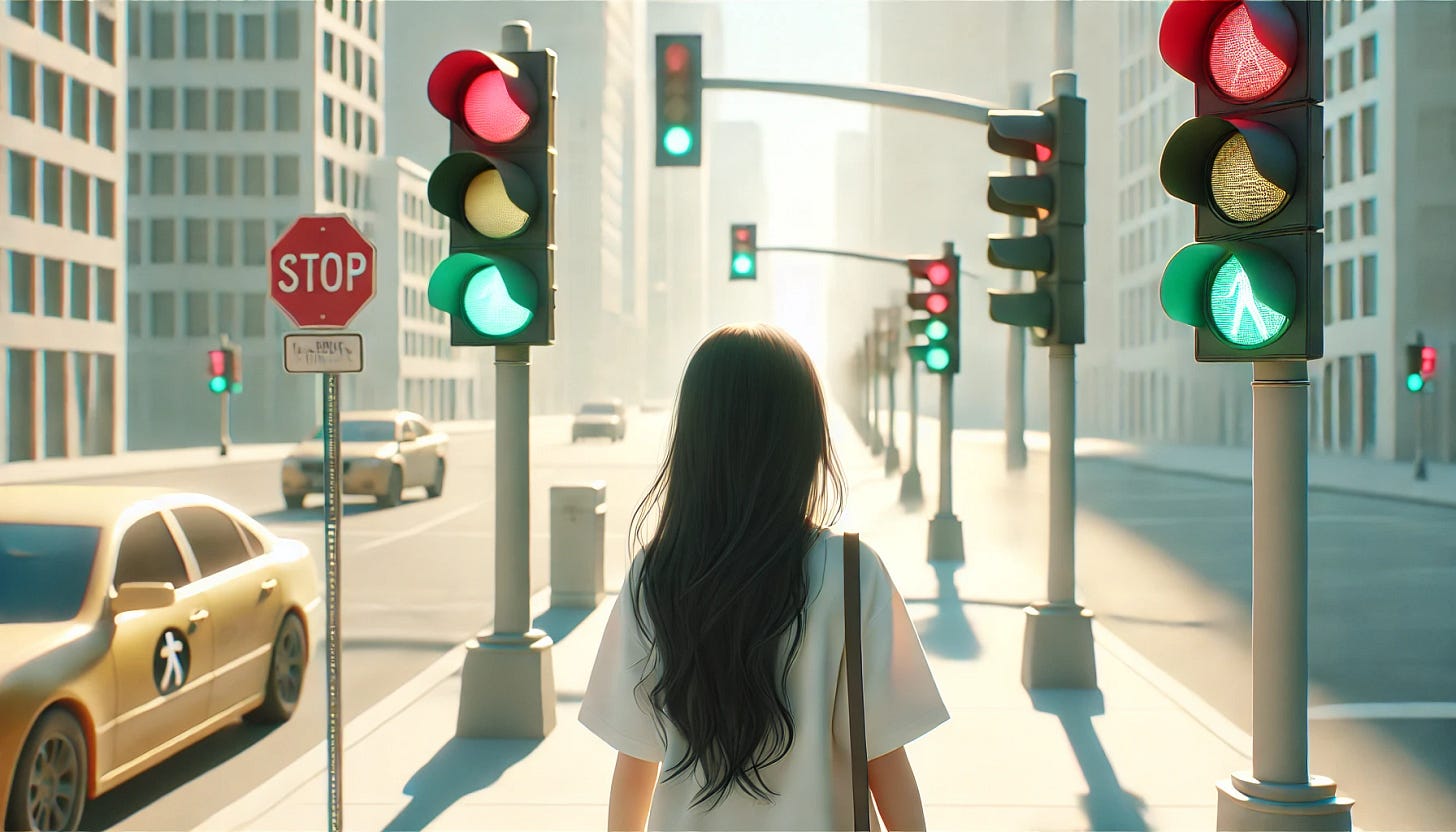On giving up control
cultivating self-trust and de-optimizing our lives
Lately, I’ve been unintentionally de-optimizing my life
In January, I stopped playing audiobooks and podcasts on 2x, returning to 1x for the first time in years. For a while, I stopped listening to audio altogether and reached for paperbacks instead. In March, I stopped tracking my daily move streak. In April, as a birthday gift to myself, I let go of my carefully curated Readwise streak and obsession with tracking every minute of my day using Toggl.
These decisions were ripple effects that emerged after my first 10-day silent meditation retreat nearly a year ago. At the time, it hadn’t dawned on me just how impactful ten days of turning inward would be beyond the ten days itself. No phones, no laptops, no books, no journals. No communication, no streaks to uphold.
The experience gave me my first taste of what it meant to return to ourselves in the hustle and bustle of modern day. It served as a forcing function to let go of all my crutches and sit with who I was — and could be — without them, unraveling some of my deepest held beliefs. It gave me an embodied sense of what freedom really meant. It began to rewire my relationship to silence, stillness, and technology.
Individually, the steps towards de-optimizing my life seem inconsequential, but as someone who hinged daily fulfillment on optimizing every margin and maintaining every streak, the idea of not maximizing and tracking was inconceivable just a few months ago. My entire life was held together by these systems.
The irony in optimizing our lives is that the nature of optimization is rooted in a lack of self-trust. I inherently didn’t trust myself to make the most of every day. As a defense mechanism, I put systems into place and scheduled my days out in 15 minute increments to take the thought out of everything.
Operating under these constraints provided me with a false sense of security — a belief that if I strove to do everything as efficiently as possible, I’d have it all under control. The reality was that the expectations I’d set for myself assumed I was a machine, capable of moving through the day with no bathroom breaks or moments to recenter, leaving no affordance for schedule changes.
While optimizing is a good short-term solution to bridge our self-trust gap, particularly in the early stages of cultivating trust, it begins to maladapt when we overindex on processes that no longer serve us, using them as a crutch for control, and override our intuition.
Ultimately, the intention is to create enough reference points where we’re keeping promises to ourselves so we can shed the systems altogether and learn to have faith in ourselves rather than further optimize the systems that keep us caged.
Eventually, we must get off the treadmill or risk it turning into a hamster wheel. It begins with learning to surrender.
raising the white flag
The notion of surrendering connotes the idea of giving up or giving in — a white flag symbolizing weakness rather than strength. In reality, it’s easier to double down and brute force our way to an outcome over surrendering to the possibilities beyond our imagination. For the clenched, strength is found in letting go of what is out of our control.
When we believe we have more power to control an outcome than we really do, we exert our energy trying to manage what is not meant to be controlled by us at all.
The desire to control manifests in our culture of optimization and accumulation in the form of productivity and time management hacks, resulting in us trying to make the most out of every moment just so we can squeeze in even more.
a penchant for control
Over the years, my penchant for control has closely mirrored the turmoil I faced (avoided) internally. My inner world was managed by a disapproving drill sergeant of an inner critic. She held high expectations for me and those around me. Try as she might to manage conflicting parts within me, she often failed and went outward in search of a situation she might be able to handle to her liking.
As a result, I often found myself triggered by things happening around me — someone speaking particularly loudly, a car alarm going off, unexpected construction happening down the street. I was under an illusion that I could control all these micro moments unfolding around me. It was only when I started “cleaning my own room” that I found that external chaos no longer activated me in the ways they used to.
As we grapple with and heal our core wounds, we learn to build safety within our minds and bodies, finding peace within rather than seeking it externally.
learning to trust the universe
What happens when we release the notion that it’s all in our control? Does our life descend into chaos as we fear?
My husband is one of those people that things always seem to work out for. He thinks in possibilities and is largely unperturbed by the notion of worst case scenarios. Even during what seems like the most impossible situations, he’s at peace that it’ll all come together — and if it doesn't, he’ll figure it out. And inevitably, it does, in fact, come together.
Early in our relationship, this way of operating stressed me out. Have you considered this scenario? What if that happens? I’d prod him with questions until I’d resign, realizing: of course you’re not worried, it’ll probably just work out for you. Sometimes, it working out for him meant that it worked out for me too so despite harboring some subconscious resentment towards his disposition, I tried my best to let it play out. It wasn’t my life to micromanage.
Over time, I began to notice all the small ways he was willing to ask for help and lend a hand when others needed a favor. It all working out wasn’t a result of him sitting back, waiting for something to be handed to him, but creating the conditions that would allow unexpected gifts to unfold before him.
He’ll be the first to admit that as a Caucasian man in the US, brought up in a loving household, he was blessed with the privilege to truly believe that things will all turn out okay. I, on the other hand, grew up as an immigrant, motivated by the worldview that nothing works out unless you make it happen.
The immigrant version of “things coming together” is brute forcing things into existence from a place of scarcity. Given their limited amount of resources, when my parents were my age in the 90s, a few wrong moves could threaten to unravel months and years of progress towards their dreams.
With hard work and sacrifices, their (and my) life circumstances dramatically improved, but the memories of what it took to arrive at a place of financial and material safety live on in them. In big and small ways, I continue to see how the tendency towards scarcity is ingrained in them — in the ways they make decisions, in their relationship with money, in their relationship with me. And how in turn, it has rippled out in me.
As I’ve slowly learned to put more faith in the universe having my back, those initial feelings of resentment towards my husband have bloomed into deep gratitude for the privilege to be in the presence of someone who deeply embodies trust and abundance.
Privilege is often looked at as something to be ashamed of, but the reality is that privilege exists regardless of how we view it. When those with privilege harness it for the greater good, we can collectively draw strength from it and create meaningful reference points of what’s possible.
red light, green light
Over the weekend while on a walk, I found myself in front of a series of red lights. As I approached the first light, it turned green. Slowly, the lights further out started turning green then yellow then red.
As I saw them change one after another, it occurred to me that trying to project how life will unfold is like expecting the stoplights to turn green at the same time and stay green.
The reality is that when we’re on one leg of the journey, walking down Street C, we don’t need to know what color the light is on Street J or Street Q yet.
When we focus so intently on the stoplights before us, it assumes that we’re certain these are the precise stoplights fated for us. Instead, what if the journey is about cultivating self-knowledge in pursuit of walking onto the path most aligned with our evolving inner truth? In that process, we may recognize that the stoplights we want to turn green are not ours to follow after all.
By releasing the notion that we must control the timing of the stoplights, we can open ourselves up to the possibility that there are paths before us that we haven’t yet stumbled upon, and that it is all — and always will be — unfolding.
How are you learning to surrender and trust the unfolding?
Thanks for reading — if you enjoyed this piece, you may also resonate with:
Thanks to Ryan for reviewing a draft of this essay and for showing me how to put faith in the universe.






I've been on a similar journey! thank you so much for sharing how you're learning to trust yourself. Here's to two immigrant girlies finding healing :)
A beautifully crafted and thoughtful letter to yourself and to all of us for whom control is a bid for safety. I particularly resonated with this: “Over the years, my penchant for control has closely mirrored the turmoil I faced (avoided) internally.”